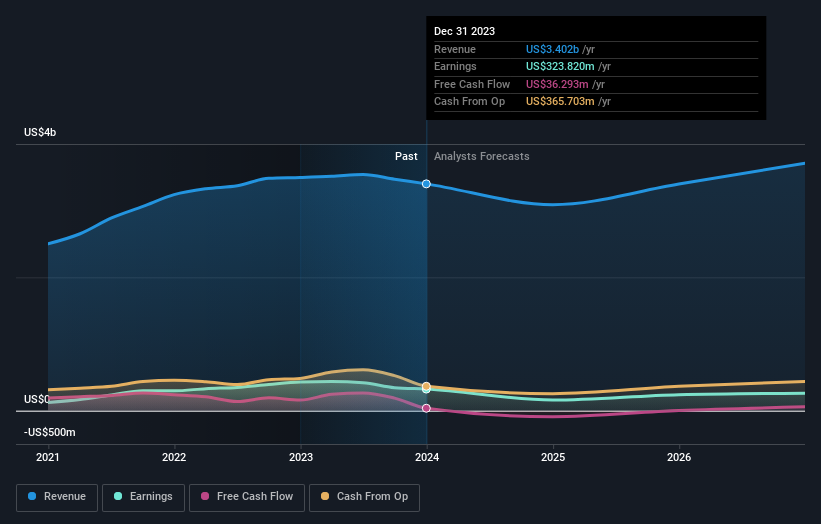What Does Vishay Intertechnology, Inc.'s (NYSE:VSH) Share Price Indicate?
Vishay Intertechnology, Inc. (NYSE:VSH), might not be a large cap stock, but it saw significant share price movement during recent months on the NYSE, rising to highs of US$24.40 and falling to the lows of US$21.15. Some share price movements can give investors a better opportunity to enter into the stock, and potentially buy at a lower price. A question to answer is whether Vishay Intertechnology's current trading price of US$22.68 reflective of the actual value of the mid-cap? Or is it currently undervalued, providing us with the opportunity to buy? Let’s take a look at Vishay Intertechnology’s outlook and value based on the most recent financial data to see if there are any catalysts for a price change.
See our latest analysis for Vishay Intertechnology
What Is Vishay Intertechnology Worth?
Great news for investors – Vishay Intertechnology is still trading at a fairly cheap price according to our price multiple model, where we compare the company's price-to-earnings ratio to the industry average. We’ve used the price-to-earnings ratio in this instance because there’s not enough visibility to forecast its cash flows. The stock’s ratio of 9.63x is currently well-below the industry average of 19.11x, meaning that it is trading at a cheaper price relative to its peers. However, given that Vishay Intertechnology’s share is fairly volatile (i.e. its price movements are magnified relative to the rest of the market) this could mean the price can sink lower, giving us another chance to buy in the future. This is based on its high beta, which is a good indicator for share price volatility.
Can we expect growth from Vishay Intertechnology?
Future outlook is an important aspect when you’re looking at buying a stock, especially if you are an investor looking for growth in your portfolio. Although value investors would argue that it’s the intrinsic value relative to the price that matter the most, a more compelling investment thesis would be high growth potential at a cheap price. However, with a negative profit growth of -19% expected over the next couple of years, near-term growth certainly doesn’t appear to be a driver for a buy decision for Vishay Intertechnology. This certainty tips the risk-return scale towards higher risk.
What This Means For You
Are you a shareholder? Although VSH is currently trading below the industry PE ratio, the negative profit outlook does bring on some uncertainty, which equates to higher risk. Consider whether you want to increase your portfolio exposure to VSH, or whether diversifying into another stock may be a better move for your total risk and return.
Are you a potential investor? If you’ve been keeping tabs on VSH for some time, but hesitant on making the leap, we recommend you dig deeper into the stock. Given its current price multiple, now is a great time to make a decision. But keep in mind the risks that come with negative growth prospects in the future.
If you want to dive deeper into Vishay Intertechnology, you'd also look into what risks it is currently facing. Our analysis shows 2 warning signs for Vishay Intertechnology (1 makes us a bit uncomfortable!) and we strongly recommend you look at them before investing.
If you are no longer interested in Vishay Intertechnology, you can use our free platform to see our list of over 50 other stocks with a high growth potential.
Have feedback on this article? Concerned about the content? Get in touch with us directly. Alternatively, email editorial-team (at) simplywallst.com.
This article by Simply Wall St is general in nature. We provide commentary based on historical data and analyst forecasts only using an unbiased methodology and our articles are not intended to be financial advice. It does not constitute a recommendation to buy or sell any stock, and does not take account of your objectives, or your financial situation. We aim to bring you long-term focused analysis driven by fundamental data. Note that our analysis may not factor in the latest price-sensitive company announcements or qualitative material. Simply Wall St has no position in any stocks mentioned.

